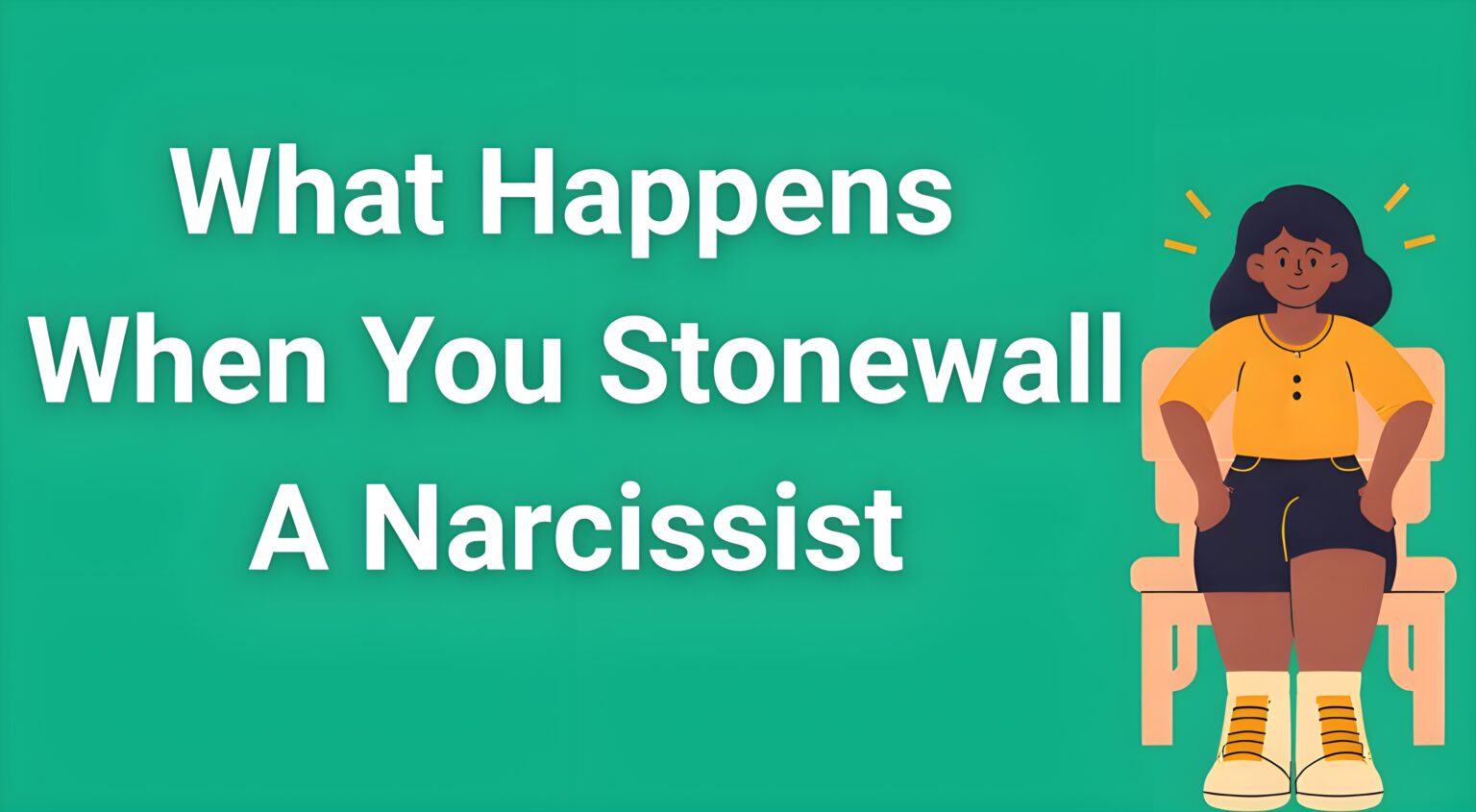Understanding what happens when you stonewall a narcissist is crucial for anyone dealing with narcissistic abuse. When you refuse to engage in their manipulative conversations or withdraw from their emotional games, narcissists respond in predictable yet often shocking ways. This comprehensive guide reveals exactly how narcissists react when their primary control mechanism—constant communication and attention—is suddenly cut off.
- Understanding Stonewalling in Narcissistic Relationships
- The 7 Shocking Reactions When You Stonewall a Narcissist
- The Science Behind These Reactions
- Effective Strategies for Maintaining Your Stonewalling Boundaries
- When Stonewalling Becomes Dangerous
- The Long-Term Impact of Stonewalling on Narcissists
- Healing and Recovery During the Stonewalling Process
- Frequently Asked Questions About Stonewalling Narcissists
- Conclusion
Stonewalling a narcissist fundamentally disrupts their need for narcissistic supply, the emotional fuel they derive from your reactions, attention, and engagement. Unlike healthy individuals who might respect your need for space, narcissists view your silence as a direct threat to their control and will employ increasingly desperate tactics to regain your attention.
Understanding Stonewalling in Narcissistic Relationships
Before diving into the specific reactions, it’s essential to understand what stonewalling means in the context of narcissistic abuse. Stonewalling involves deliberately withdrawing from communication, refusing to engage in arguments, and maintaining emotional distance from the narcissist’s attempts at manipulation.
This strategy differs significantly from the silent treatment that narcissists often use against their victims. When you stonewall a narcissist, you’re implementing a protective boundary rather than using silence as punishment or control. Your stonewalling serves as emotional self-preservation, while their silent treatment aims to manipulate and punish.
The Psychology Behind Narcissistic Reactions
Narcissists thrive on attention, whether positive or negative. Their entire sense of self depends on external validation and the ability to control others’ emotions. When you stonewall them, you’re essentially cutting off their supply of emotional food, triggering what psychologists call “narcissistic injury”—a deep wound to their grandiose self-image.
This injury activates their primitive defense mechanisms, leading to increasingly desperate attempts to re-establish control. Understanding this psychological framework helps explain why their reactions often seem so extreme and irrational.
The 7 Shocking Reactions When You Stonewall a Narcissist
1. Narcissistic Rage and Explosive Outbursts
The most immediate reaction when you stonewall a narcissist is often explosive anger. This isn’t ordinary frustration—it’s narcissistic rage, an intense emotional response that can include verbal abuse, threats, and in some cases, physical aggression.
During these outbursts, narcissists may:
- Scream accusations and insults designed to provoke a response
- Threaten consequences for your “disrespectful” behavior
- Blame you for “ruining” the relationship or situation
- Escalate their volume and intensity to break your resolve
This rage stems from their inability to tolerate being ignored or dismissed. Your stonewalling threatens their sense of superiority and control, triggering a desperate attempt to regain dominance through intimidation.
Safety Note: If you’re experiencing physical threats or violence when stonewalling a narcissist, prioritize your safety immediately and seek professional help.
2. Love Bombing and False Charm Offensive
When rage fails to break your silence, many narcissists shift to love bombing—an overwhelming display of affection, gifts, and promises designed to draw you back into their web. This manipulation tactic can be particularly confusing because it mirrors the idealization phase that originally attracted you to them.
During this phase, they might:
- Send excessive texts, emails, or flowers
- Promise dramatic changes in their behavior
- Share emotional stories about missing you or needing you
- Use shared memories or inside jokes to trigger emotional responses
Remember that this sudden kindness isn’t genuine—it’s a calculated attempt to break your boundaries and regain control. Once you engage, they’ll likely return to their previous abusive patterns.
3. Hoovering Attempts Through Multiple Channels
Named after the vacuum cleaner brand, hoovering describes the narcissist’s attempt to “suck” you back into the relationship through various means. When direct communication fails, they’ll often employ multiple strategies:
- Flying Monkeys: They’ll recruit mutual friends, family members, or colleagues to deliver messages or gather information about you
- Social Media Stalking: Excessive viewing of your profiles, commenting on old posts, or creating fake accounts to monitor your activities
- Indirect Contact: Showing up at places they know you frequent, contacting your workplace, or using children as messengers in co-parenting situations
- Emergency Situations: Creating or exaggerating crises to force your response
These hoovering attempts can persist for months or even years, demonstrating the narcissist’s inability to accept your boundaries.
4. Smear Campaigns and Character Assassination
When a narcissist realizes your stonewalling is serious, they often launch a smear campaign designed to damage your reputation and isolate you from support systems. This reaction serves multiple purposes:
- Punishing you for withdrawing their narcissistic supply
- Controlling the narrative to maintain their public image
- Isolating you from potential allies who might support your decision
- Creating pressure for you to engage in defending yourself
During smear campaigns, narcissists typically:
- Share private information or secrets you confided in them
- Exaggerate or fabricate stories about your behavior
- Paint themselves as the victim of your “cruel” stonewalling
- Rally others to their side by portraying you as unstable or vindictive
The psychological impact of these campaigns can be devastating, especially when friends or family members believe the narcissist’s version of events.
5. Escalating Boundary Violations
Stonewalling represents a clear boundary, and narcissists despise boundaries of any kind. They’ll often respond by deliberately violating your stated limits in increasingly aggressive ways:
- Physical Intrusions: Showing up uninvited at your home, workplace, or social events
- Digital Harassment: Creating multiple accounts to contact you after being blocked
- Third-Party Manipulation: Using children, pets, or shared responsibilities as leverage
- Legal Threats: Threatening lawsuits or using the legal system as harassment
These escalations serve to test your resolve while demonstrating their refusal to accept your autonomy. Each violation sends the message that your boundaries don’t matter to them.
6. Playing the Victim Card
Many narcissists respond to stonewalling by positioning themselves as the injured party. This manipulation tactic is designed to trigger your empathy and guilt, common traits that initially attracted them to you. They might claim:
- Depression or Suicidal Thoughts: Using mental health as emotional blackmail
- Financial Hardship: Blaming their problems on your absence
- Health Issues: Real or exaggerated medical conditions requiring your attention
- Loneliness and Abandonment: Portraying themselves as helpless without you
This victim playing can be particularly effective if you’re someone who naturally wants to help others in distress. However, responding to these claims typically leads to renewed manipulation and control.
7. Discard and Replacement
Sometimes, particularly stubborn narcissists respond to persistent stonewalling by discarding you entirely—but not quietly. This final reaction involves:
- Public Replacement: Quickly entering a new relationship and flaunting it publicly
- Final Insults: Delivering cruel parting shots designed to inflict maximum emotional damage
- Blocking and Deletion: Removing you from all social media platforms
- Spreading Closure Narratives: Telling others they “finally realized” you were the problem
While being discarded by a narcissist can initially feel devastating, it often represents the ultimate success of your stonewalling strategy. They’ve essentially removed themselves from your life, though they may attempt to return later through hoovering.
The Science Behind These Reactions
Understanding why narcissists react so intensely to stonewalling requires examining the neurological basis of narcissistic personality patterns. Research in neuroscience reveals that individuals with narcissistic traits often have underdeveloped emotional regulation systems, making them particularly reactive to perceived threats to their self-image.
When you stonewall a narcissist, you’re triggering their deepest fear—abandonment and loss of control. This creates a neurological cascade similar to a fight-or-flight response, explaining why their reactions often seem so disproportionate to the situation.
The Trauma Bond Connection
If you’ve been in a relationship with a narcissist for an extended period, you’ve likely developed what psychologists call a trauma bond—a psychological connection formed through cycles of abuse and intermittent reinforcement. This bond can make their extreme reactions to your stonewalling feel more intense and emotionally triggering.
Understanding trauma bonding helps explain why witnessing their distress or anger when you stonewall them can feel so uncomfortable, even when you know their behavior is manipulative. Your brain has been conditioned to respond to their emotional states as threats to your safety and well-being.
For those struggling with the intense feelings that arise during stonewalling, specialized resources like trauma bond recovery programs can provide structured support for breaking these psychological chains permanently.
Effective Strategies for Maintaining Your Stonewalling Boundaries
Successfully stonewalling a narcissist requires more than just refusing to communicate—it demands a comprehensive strategy that protects your emotional and physical well-being while maintaining your resolve.
The Gray Rock Method Enhancement
While stonewalling focuses on withdrawing communication, the Gray Rock Method involves becoming as uninteresting as possible during unavoidable interactions. Combining these approaches creates a powerful barrier against narcissistic manipulation:
- Minimal Responses: When forced to communicate, use short, factual answers
- Emotional Neutrality: Avoid displaying any strong emotions that might provide supply
- Boring Topics: Redirect conversations to mundane subjects like weather or traffic
- Consistent Boundaries: Never vary your level of engagement, regardless of their tactics
Documentation and Evidence Collection
When stonewalling a narcissist, their escalating reactions often provide valuable evidence of their abusive behavior. Maintaining detailed records serves multiple purposes:
- Legal Protection: Courts and law enforcement take documented patterns more seriously
- Reality Confirmation: Written records help combat gaslighting attempts
- Professional Support: Therapists and counselors can better understand your situation
- Safety Planning: Patterns in their behavior can help predict future escalations
Building Your Support Network
Narcissists excel at isolating their victims, making your support network crucial during stonewalling periods. This network might include:
- Trauma-Informed Therapists: Professionals who understand narcissistic abuse patterns
- Support Groups: Both online and offline communities of abuse survivors
- Trusted Friends and Family: People who’ve witnessed the narcissist’s behavior firsthand
- Professional Services: Legal advisors, domestic violence counselors, and safety planning resources
Sometimes, gaining clarity about your specific situation requires expert analysis. Professional assessment services can help you understand exactly what type of narcissistic patterns you’re dealing with and provide personalized strategies for maintaining your boundaries effectively.
When Stonewalling Becomes Dangerous
While stonewalling can be an effective protective strategy, it’s crucial to recognize when this approach might escalate dangerous behavior. Certain types of narcissists, particularly those with antisocial traits or histories of violence, may respond to stonewalling with increasing aggression.
Red Flag Warning Signs
Watch for these escalation indicators that suggest your safety might be at risk:
- Threats of physical violence or property destruction
- Stalking behaviors that intensify rather than decrease over time
- Involving children or pets as leverage or targets
- Legal or financial retaliation that threatens your stability
- Recruitment of dangerous allies or threats from third parties
If you observe these patterns, stonewalling alone may not be sufficient protection. In such cases, safety planning with domestic violence professionals becomes essential.
Alternative Strategies for High-Risk Situations
When stonewalling becomes dangerous, consider these modified approaches:
- Modified Contact: Limiting communication to essential topics only
- Supervised Communication: Using third parties or documented channels
- Legal Boundaries: Obtaining restraining orders or legal protections
- Safety Planning: Developing escape routes and emergency protocols
For individuals who cannot safely implement complete stonewalling—such as those sharing children with a narcissist—specialized strategies for managing ongoing contact while protecting emotional well-being become crucial.
The Long-Term Impact of Stonewalling on Narcissists
Understanding the long-term effects of your stonewalling can help you maintain resolve during difficult moments. While narcissists may initially escalate their behavior, consistent boundaries often lead to predictable outcomes.
Eventual Acceptance or Departure
Most narcissists eventually recognize when their manipulation tactics aren’t working. This recognition typically leads to one of two outcomes:
- Seeking New Supply: They redirect their attention toward more responsive targets
- Grudging Respect: In some cases, they may actually develop a form of respect for your boundaries (though this doesn’t mean they’ve changed fundamentally)
The Cycle of Returns
It’s important to note that narcissists rarely give up permanently. Even after periods of apparent acceptance, they may return months or years later with new hoovering attempts, especially during your moments of vulnerability or success.
Preparing for these eventual return attempts helps maintain your boundaries over the long term and prevents you from being caught off-guard by renewed manipulation efforts.
Healing and Recovery During the Stonewalling Process
Implementing stonewalling boundaries, while protective, can also bring up intense emotions and trauma responses. The process of separating from a narcissist often involves working through complex feelings of guilt, fear, and attachment.
Processing Trauma Responses
Your nervous system may react strongly to the narcissist’s escalating behavior, even when you’re maintaining strong boundaries. Common trauma responses during this period include:
- Hypervigilance: Constantly watching for their next move
- Emotional Numbness: Shutting down feelings as protection
- Physical Symptoms: Headaches, insomnia, or digestive issues
- Intrusive Thoughts: Replaying past interactions or anticipating future conflicts
Building Emotional Resilience
Recovery from narcissistic abuse involves rebuilding your sense of self and learning to trust your perceptions again. This process takes time and often benefits from structured approaches that address both the psychological and neurological impacts of abuse.
Developing emotional resilience helps you maintain your stonewalling boundaries even when the narcissist’s reactions trigger your deepest fears or emotional wounds.
Frequently Asked Questions About Stonewalling Narcissists
Q: How long should I maintain stonewalling boundaries?
A: The duration depends on your specific situation and safety needs. Some people maintain permanent no-contact, while others may eventually establish limited contact with strong boundaries. The key is prioritizing your emotional and physical well-being above all other considerations.
Q: What if the narcissist claims to have changed?
A: Genuine change in narcissistic individuals is extremely rare and typically requires years of intensive therapy. Most “change” claims are temporary manipulation tactics designed to break your boundaries. Look for consistent behavioral changes over extended periods, not promises or short-term improvements.
Q: Is it okay to feel guilty about stonewalling them?
A: Guilt is a common and normal response, especially if you’ve been conditioned to prioritize their needs over your own. Remember that protecting yourself from abuse is not cruel—it’s necessary for your health and well-being.
Q: What if we have children together?
A: Co-parenting with a narcissist requires modified strategies that protect both you and your children while maintaining necessary communication. This might involve parallel parenting approaches, communication through apps, or supervised exchanges.
Q: Can stonewalling make them more dangerous?
A: While some narcissists may escalate initially, maintaining consistent boundaries often leads to them seeking easier targets. However, if you have safety concerns, work with professionals to develop appropriate safety plans before implementing stonewalling.
Q: How do I handle flying monkeys during stonewalling?
A: Prepare brief, consistent responses for people the narcissist sends to contact you. Something like “I’m not discussing my personal relationships right now, but I appreciate your concern” can be effective. Don’t feel obligated to explain or defend your boundaries to third parties.
Conclusion
Understanding what happens when you stonewall a narcissist empowers you to maintain your boundaries despite their predictable but intense reactions. From narcissistic rage and love bombing to smear campaigns and boundary violations, their responses follow recognizable patterns rooted in their deep fear of losing control.
Remember that their extreme reactions actually validate the effectiveness of your boundaries. Healthy individuals respect when others need space or choose not to engage. Only those who rely on manipulation and control react with such desperation to simple boundary-setting.
Your decision to stonewall a narcissist represents a crucial step in reclaiming your autonomy and protecting your mental health. While their reactions may be intense and sometimes frightening, maintaining these boundaries is essential for breaking free from the cycle of narcissistic abuse.
The journey toward freedom from narcissistic manipulation is challenging but absolutely possible. Thousands of survivors have successfully implemented these strategies and rebuilt their lives. With proper support, clear boundaries, and commitment to your own well-being, you too can break free from the exhausting cycle of narcissistic control and create the peaceful, authentic life you deserve.






